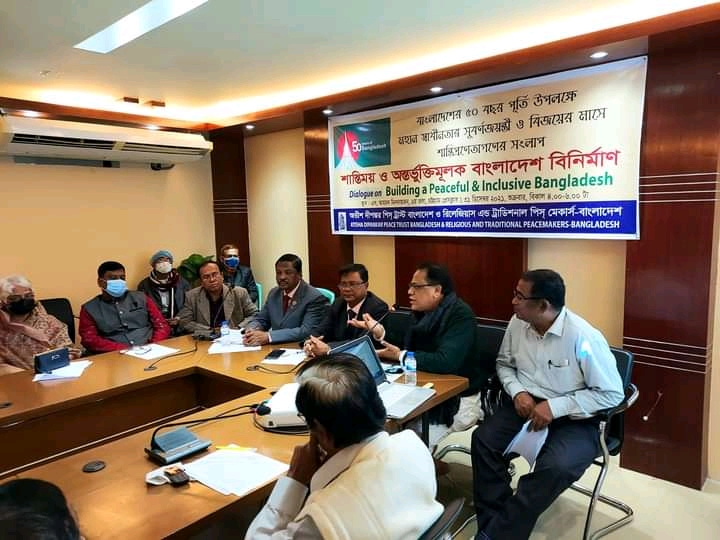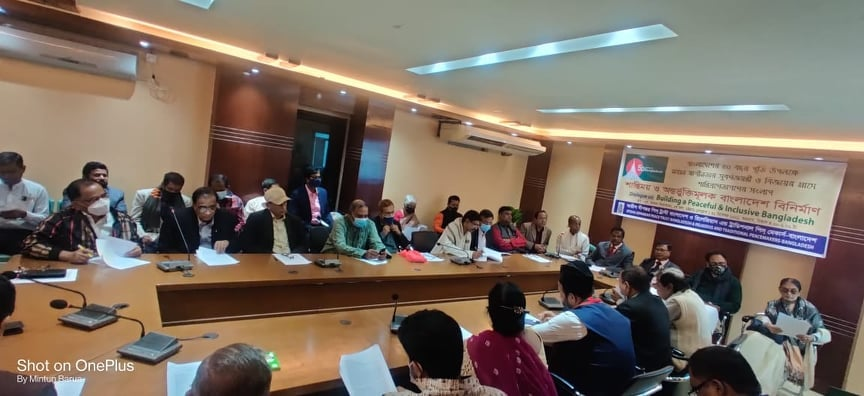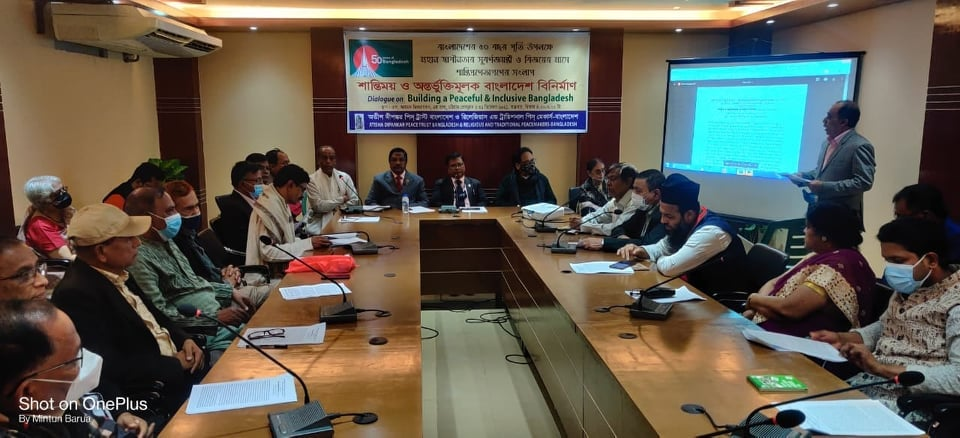A celebration of Bangladesh’s 50 year and golden jubilee of Independence was held on December 31, 2021, at the Chattogram Press Club (Sultan Ahmed Auditorium). The Atisha Dipankar Peace Trust Bangladesh & Religious and Traditional Peacemakers-Bangladesh organized the round table dialogue on Building a Peaceful and Inclusive Bangladesh to commemorate the anniversary. A total of 55 local peacebuilders from the heroic freedom fighters, educationalists, political leaders, development activists, religious and traditional peacemakers participated in the dialogue. The participants discussed the nation’s progress toward building a peaceful and inclusive Bangladesh where every citizen would enjoy: constitutional and basic fundamental rights; feel valued; participate in decision making processes; meaningfully engage youth and women; ensure quality education; reduce discrimination, religious motivated tensions and violence; build trust; connectivity; encouraging young learners in multi-religious literacy; promote national historic cultural values; engage in social innovations; have sustainable development; embrace mindful religious teachings in achieving well-being for humanity; and best practice of spiritual learning.
The speakers highlighted that although independence was the nation’s highest achievement, we have a long way to go in order to build a peaceful and inclusive Bangladesh which was the core objective of independence. Developing a long term strategic plan is needed to establish a just society, where all men, women and children enjoy the basic fundamental needs, equality and justice, political, economic and social achievements in their respective way of life. This plan needs to clarify the role of the religious and traditional peacemakers in achieving collective goals from individuals, families and communities across the country. Approaches to implement the strategic plan need to represent the needs of local to state level institutions.
The speakers suggested submitting the findings and recommendations to the Prime Minister of Bangladesh to be added to and implemented with state level policies. The discussion among the various traditions of peacemakers was lively with commitments made to work jointly in meaningful ways reaching a diverse group of people that will work for a better Bangladesh. Professor Tushar Kanti Barua, Chairman, Atisha Dipankar Peace Trust Bangladesh presided over the dialogue session. Among the participants Prof. Dr. Mohammed Sakendhar Chowdhury, Prof. Ranjit Kumer Dey, Prof. Rita Dutta, Prof. Dr. Bikiran Prasad Barua, heroic freedom fighter Abul Fazal, principal Shimul Barua, Rev Asai Tripura, Iqbal Bahar Sabery, Ms Fatema Beagum, Shouman Chakraborty, Hasan Md. Ripon, Pronab Raz Barua were the remarkable speakers of the dialogue. The keynote paper on Building a Peaceful and Inclusive Bangladesh that described- our achievements and expectations was submitted by Sanat Kumar Barua, General Secretary, Atisha Dipankar Peace Trust Bangladesh and national coordinator, Religious and Traditional Peacemakers- Bangladesh.
The following observations and recommendations were made regarding building a peaceful and inclusive Bangladesh:
1) Observation: Local peacemakers efforts would be organized, meaningful and equipped for building a secular, democratic and peaceful Bangladesh embracing the state constitution in which the rule of law, fundamental human rights and freedom, equality and justice, political, economic and social rights are secured for all its citizens.
Recommendation: It needs more collaboration and networking with the government, local and international bodies.
2) Observation: In the last fifty years national achievements in social, economic, public health care, education, infrastructure, communication systems etc., have achieved more. However, sustainable policies, people’s expectation and participation, moral and materialistic development are absent. In order to support national interest, sometimes religious or social values are not practiced to: reduce corruption, prevent exploiting the population, misuse national resources, wealth, state power which are against people’s will and independence.
Recommendation: It is urgently needed to motivate the people to build a patriotic , value-based society and apply the best use of religious teachings rather than practicing religions as the tool of self- interest or for pursuing state power.
3) Observation: Changes to the primary level national education system urgently needed, because currently religious learning generates divisions; leads to religious motivated supremacy and, hate crimes; is discriminatory rather than generating love, empathy, respect and so on.
Recommendation: Designing an early childhood value-based education system and multi-religious literacy within Bangladesh’s primary level education system. Also examine education policies in other South Asian countries.
4) Observation: Societal peace and sustainability are the main tools for national progress and development.
Recommendation: The participants emphasized developing a long- term strategic plan to equip and engage in social actions, sustainable development issues, positive change, innovative ways that encourage youth and women to include and also to encourage the unlike minded people in respecting their constructing views through dialogue and motivation.
5) Observation: Radicalization, religiously motivated tension, intolerance, and violent conflict frequently occur nowadays in Bangladesh.
Recommendation: An action plan is needed to identify the root causes and social actions to reduce conflict on a small scale.
6) Observation: The peacemakers prioritized practicing inclusivity in every stage of state levels. But it is regrettable that it is not customized in the present situation.
Recommendation: It should take proper steps within government and non-government levels to meet people’s expectations, respect their uniqueness, diversity and make them feel valued within a just and peaceful society.
7) Observation: The peacemakers argued that our expectation of independence is to build a just and peaceful Bangladesh where everybody enjoys dignified, equitable opportunities and no one leaves behind.
Recommendation: It needs a long- term strategic plan and eagerly wishes to contribute individually and collectively along with the government for promoting an Inclusive Bangladesh for the people.




0 Comments